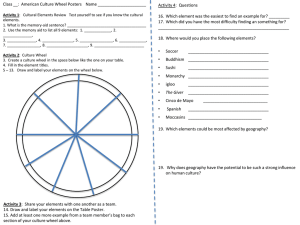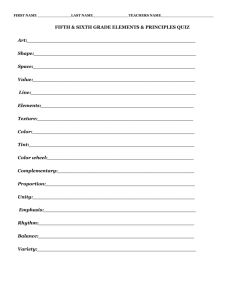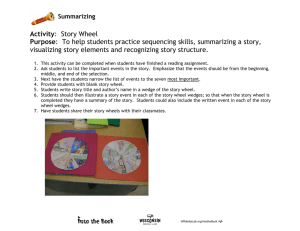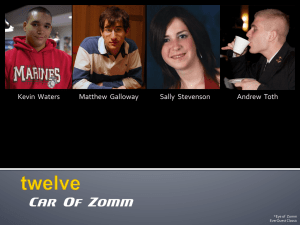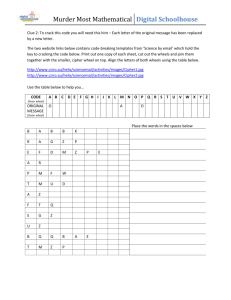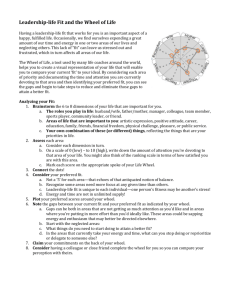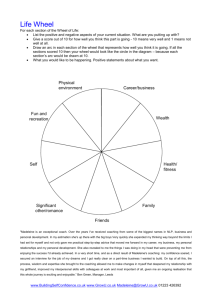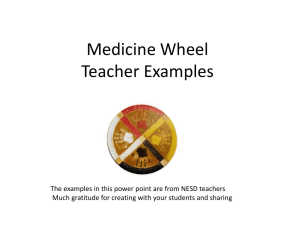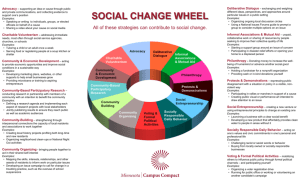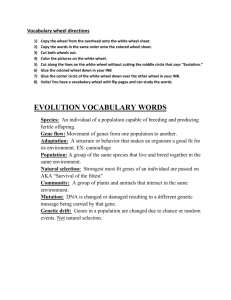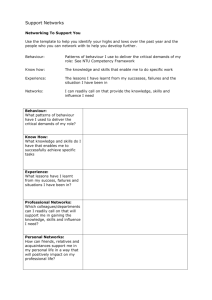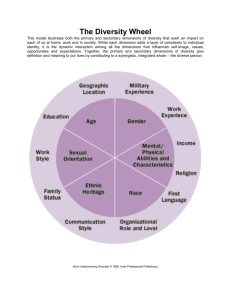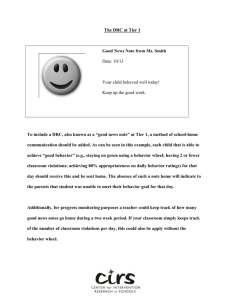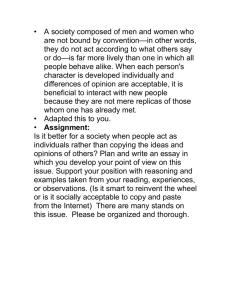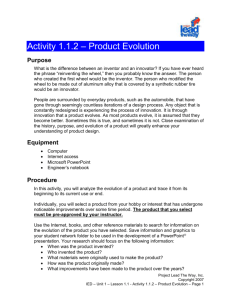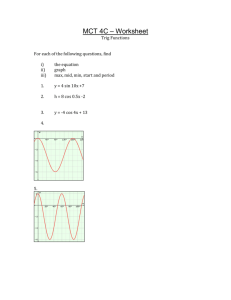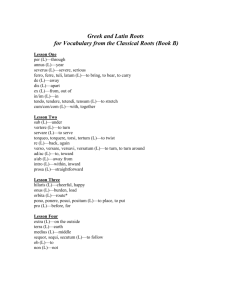what else can you do? the big picture diversity applies to everyone
advertisement
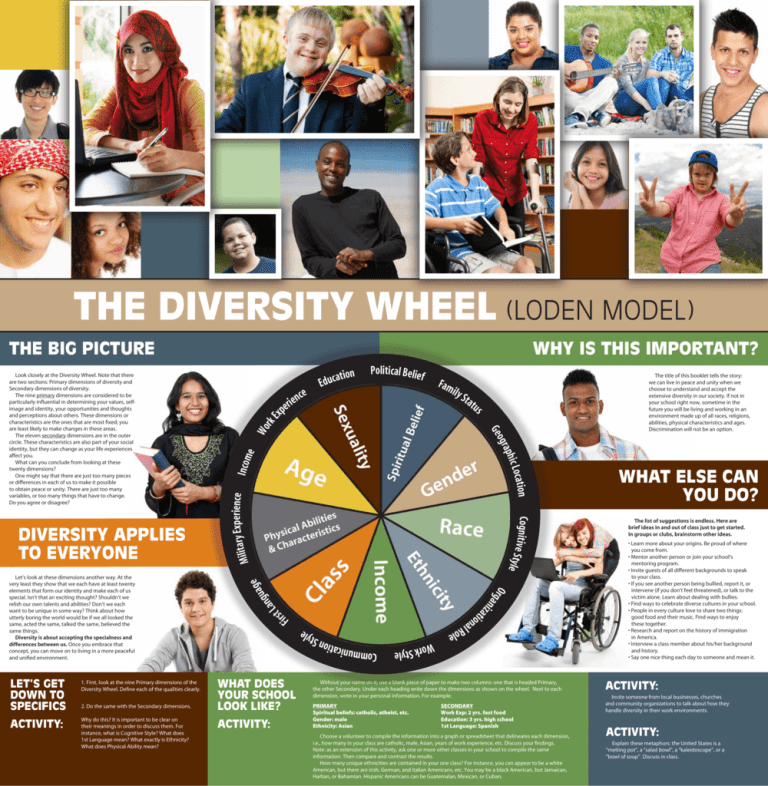
THE DIVERSITY WHEEL (Loden Model) THE BIG PICTURE Wo rk E x Incom e y Experience r a t i l i M e g a u g n a tL Cogni t i v e S t yle Work Style Communic a t i o n S t y l e ACTIVITY: o le Fir s WHAT DOES YOUR SCHOOL LOOK LIKE? R nal tio Why do this? It is important to be clear on their meanings in order to discuss them. For instance, what is Cognitive Style? What does 1st Language mean? What exactly is Ethnicity? What does Physical Ability mean? ation ACTIVITY: 2. Do the same with the Secondary dimensions. us ic Loc 1. First, look at the nine Primary dimensions of the Diversity Wheel. Define each of the qualities clearly. ly S tat Or LET’S GET DOWN TO SPECIFICS Fam i The title of this booklet tells the story: we can live in peace and unity when we choose to understand and accept the extensive diversity in our society. If not in your school right now, sometime in the future you will be living and working in an environment made up of all races, religions, abilities, physical characteristics and ages. Discrimination will not be an option. g an i z a Let’s look at these dimensions another way. At the very least they show that we each have at least twenty elements that form our identity and make each of us special. Isn’t that an exciting thought? Shouldn’t we relish our own talents and abilities? Don’t we each want to be unique in some way? Think about how utterly boring the world would be if we all looked the same, acted the same, talked the same, believed the same things. Diversity is about accepting the specialness and differences between us. Once you embrace that concept, you can move on to living in a more peaceful and unified environment. Political Belief raph DIVERSITY APPLIES TO EVERYONE p e c n e eri n o i t a c Edu g Geo Look closely at the Diversity Wheel. Note that there are two sections: Primary dimensions of diversity and Secondary dimensions of diversity. The nine primary dimensions are considered to be particularly influential in determining your values, selfimage and identity, your opportunities and thoughts and perceptions about others. These dimensions or characteristics are the ones that are most fixed; you are least likely to make changes in these areas. The eleven secondary dimensions are in the outer circle. These characteristics are also part of your social identity, but they can change as your life experiences affect you. What can you conclude from looking at these twenty dimensions? One might say that there are just too many pieces or differences in each of us to make it possible to obtain peace or unity. There are just too many variables, or too many things that have to change. Do you agree or disagree? WHY IS THIS IMPORTANT? Without your name on it, use a blank piece of paper to make two columns: one that is headed Primary, the other Secondary. Under each heading write down the dimensions as shown on the wheel. Next to each dimension, write in your personal information. For example: PRIMARY Spiritual beliefs: catholic, atheist, etc. Gender: male Ethnicity: Asian SECONDARY Work Exp: 2 yrs. fast food Education: 3 yrs. high school 1st Language: Spanish Choose a volunteer to compile the information into a graph or spreadsheet that delineates each dimension, i.e., how many in your class are catholic, male, Asian, years of work experience, etc. Discuss your findings. Note: as an extension of this activity, ask one or more other classes in your school to compile the same information. Then compare and contrast the results. How many unique ethnicities are contained in your one class? For instance, you can appear to be a white American, but there are Irish, German, and Italian Americans, etc. You may be a black American, but Jamaican, Haitian, or Bahamian. Hispanic Americans can be Guatemalan, Mexican, or Cuban. What else can you do? The list of suggestions is endless. Here are brief ideas in and out of class just to get started. In groups or clubs, brainstorm other ideas. • Learn more about your origins. Be proud of where you come from. • Mentor another person or join your school’s mentoring program. • Invite guests of all different backgrounds to speak to your class. • If you see another person being bullied, report it, or intervene (if you don’t feel threatened), or talk to the victim alone. Learn about dealing with bullies. • Find ways to celebrate diverse cultures in your school. • People in every culture love to share two things: good food and their music. Find ways to enjoy these together. • Research and report on the history of immigration in America. • Interview a class member about his/her background and history. • Say one nice thing each day to someone and mean it. ACTIVITY: Invite someone from local businesses, churches and community organizations to talk about how they handle diversity in their work environments. ACTIVITY: Explain these metaphors: the United States is a “melting pot”, a “salad bowl”, a “kaleidoscope”, or a “bowl of soup”. Discuss in class.
